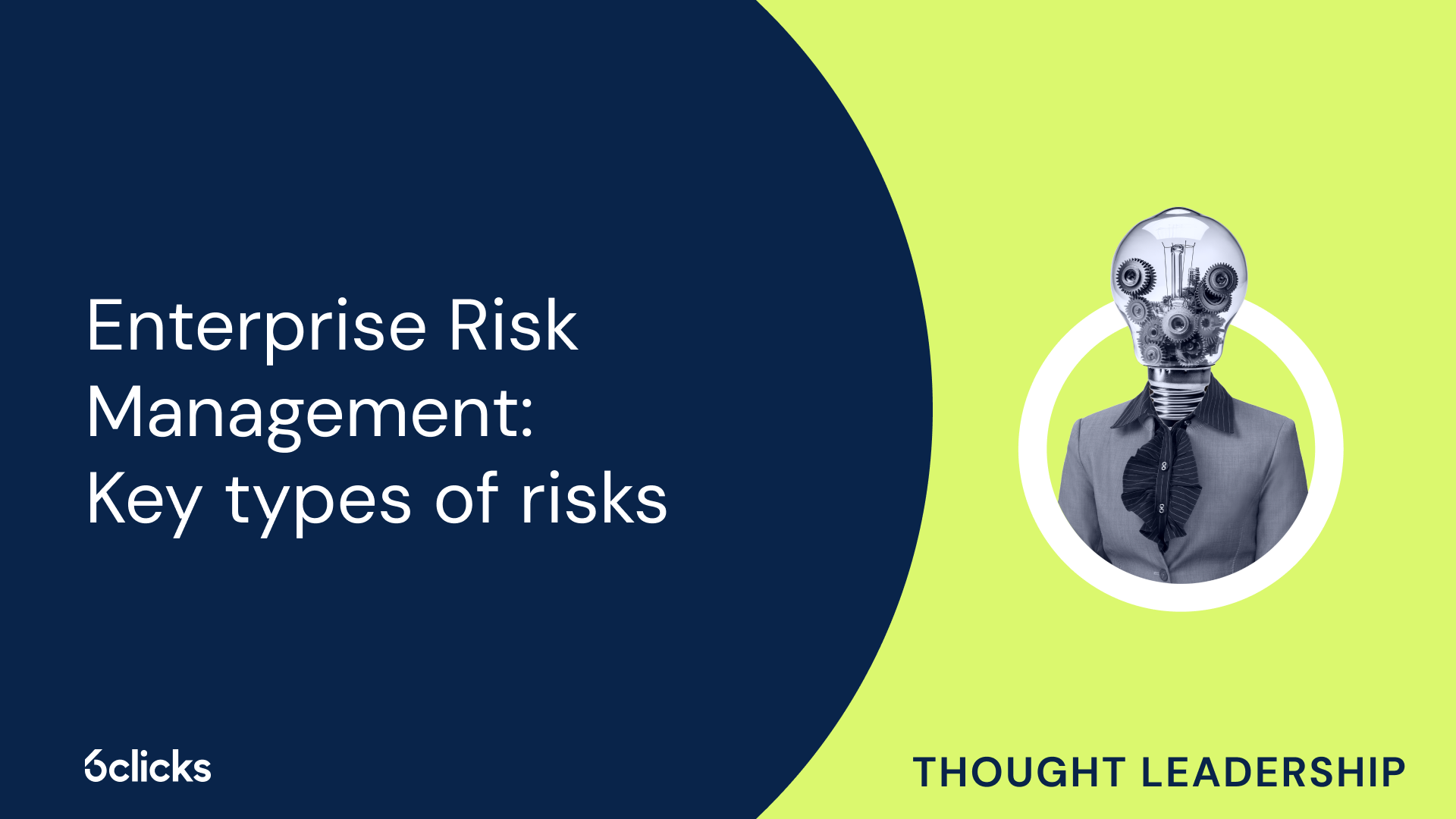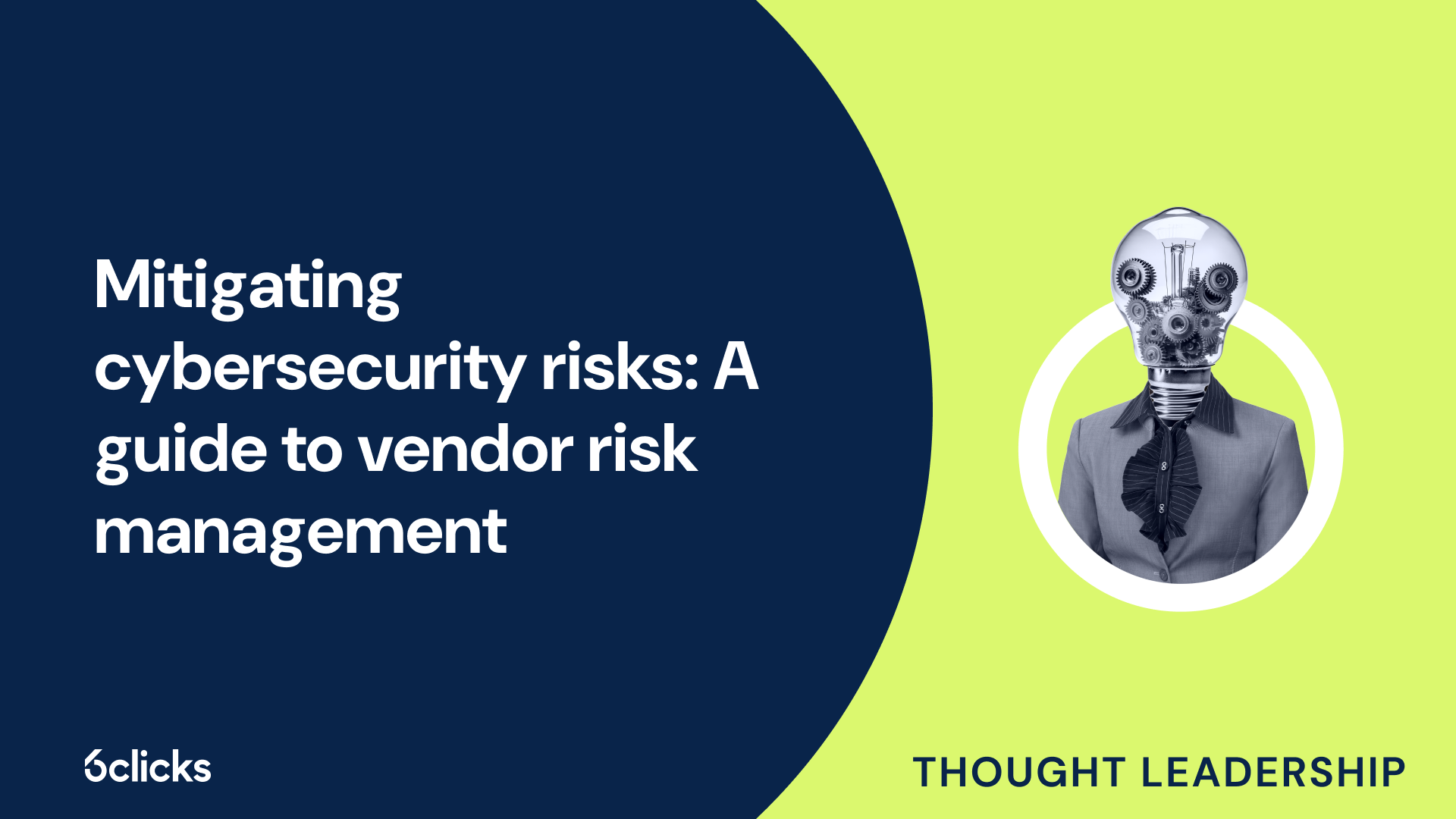The GRC buyer’s guide for 2025: Building resilience with AI-powered, federated solutions
-1.png?width=314&height=391&name=Group%20193%20(1)-1.png)
The GRC buyer’s guide for 2025: Building resilience with AI-powered, federated solutions
What is ISO 27001?
ISO 27001 is an international standard that provides organizations with a systematic approach to managing information security risks. It establishes the criteria for implementing an Information Security Management System (ISMS) that aims to protect the confidentiality, integrity, and availability of information. By adopting ISO 27001, organizations can demonstrate their commitment to managing and mitigating security risks effectively. This standard provides a comprehensive framework for establishing, implementing, maintaining, and continually improving an ISMS, enabling organizations to protect sensitive information and ensure the integrity of their operations. ISO 27001 covers various aspects of information security, including risk assessment, security controls, communication security, operations security, and business continuity management. It helps organizations identify and address security threats and vulnerabilities, comply with legal and regulatory requirements, and enhance their overall security posture. Achieving ISO 27001 certification from recognized certification bodies validates an organization's adherence to international security standards and gives them a competitive advantage by demonstrating their commitment to protecting their assets and ensuring the security of their stakeholders' information.
Why is ISO 27001 important?
ISO 27001 is an international standard that helps organizations establish, implement, and maintain an Information Security Management System (ISMS). It plays a crucial role in helping organizations identify and manage risks effectively, consistently, and measurably.
One of the key benefits of ISO 27001 is its ability to minimize information security and data protection risks. By implementing the standard's requirements, organizations can reduce the likelihood of security breaches, data leaks, and other cyber threats. This not only protects highly prized information assets but also helps build customer trust.
ISO 27001 also enables organizations to streamline their processes. By implementing a risk-based approach to information security and data protection, organizations can identify and prioritize areas that require improvement, thereby optimizing operations and resource allocation.
Furthermore, achieving ISO 27001 certification can provide a competitive advantage. It demonstrates a commitment to information security and data protection, giving customers, partners, and stakeholders confidence in the organization's ability to handle their sensitive data securely.
In today's data-driven world, ISO 27001 is crucial for organizations looking to survive and thrive. With the increasing risks and regulatory requirements related to information security, ISO 27001 provides a systematic approach to managing and mitigating these risks. It helps organizations comply with industry regulations and legal requirements, while also enabling continual improvement through a cycle of risk assessment, corrective actions, and preventive actions. By implementing ISO 27001, organizations can establish a robust and resilient security management system that safeguards their valuable information assets and helps them stay ahead in the ever-evolving landscape of cyber threats.
Certification bodies
Certification bodies play a crucial role in the ISO 27001 certification process. These organizations are accredited to assess and certify that an organization's Information Security Management System (ISMS) meets the requirements of the ISO/IEC 27001:2022 international standard. Certification bodies conduct external audits, verifying the implementation and effectiveness of an organization's security controls, security policies, and risk management processes. Through a rigorous evaluation process, certification bodies provide independent assurance that an organization has established and maintains a robust ISMS. By obtaining certification from an accredited certification body, organizations can demonstrate compliance with internationally recognized security standards, gaining the trust and confidence of customers, partners, and stakeholders. Certification bodies play a pivotal role in promoting information security and data protection across various industries, ensuring organizations adhere to best practices and continuously improve their security management systems.
Who are the certification bodies for ISO 27001?
Certification bodies play a crucial role in the ISO 27001 certification process. These organizations are responsible for evaluating and determining whether a company's information security management system (ISMS) meets the requirements set forth in the ISO 27001 standard.
There are several well-known certification bodies that have gained credibility and reputation in the field of ISO 27001 certification. These bodies have been accredited by recognized accreditation bodies, which further assures their competence and impartiality in assessing organizations for ISO 27001 compliance.
Accreditation is an important aspect of certification bodies as it validates their ability to carry out evaluations in a consistent and reliable manner. By undergoing a rigorous evaluation process themselves, certification bodies demonstrate their adherence to international standards and best practices in certification services.
When choosing a certification body for ISO 27001, organizations should consider their accreditation status, industry expertise, and reputation. Working with an accredited and credible certification body helps businesses gain confidence in their ISO 27001 certification, signaling their commitment to information security and providing assurance to stakeholders that their systems are robust and compliant.
What do certification bodies do?
Certification bodies play a critical role in the ISO 27001 certification process. These organizations are responsible for evaluating and certifying companies for compliance with the ISO 27001 standard. Their main role is to verify that an organization has implemented an effective information security management system (ISMS) that meets the requirements of ISO 27001.
Certification bodies have the responsibility to conduct comprehensive assessments of an organization's ISMS. This involves reviewing documentation, conducting interviews, and performing on-site audits to determine if the organization's security controls and policies align with the ISO 27001 standard. They assess the effectiveness of the controls implemented to mitigate security risks and identify any areas for improvement.
However, it's essential to understand that certification bodies have certain limitations. They do not enforce or mandate any specific security controls or policies. Instead, they assess and verify the implementation of controls based on ISO 27001 requirements. Additionally, certification bodies do not provide consulting services to help organizations develop or enhance their ISMS.
The certification process typically involves several steps, starting with the organization's application for certification. The certification body will then conduct an initial document review, followed by an on-site audit to assess the organization's ISMS implementation. If any non-conforming issues are identified, the organization must address them through corrective actions. Only after a minimum of three months of evidence and successful completion of the audits, the certification body will recommend certification.
How does certification work?
The process of certification for ISO 27001 involves several important steps. It begins with the organization completing a quote request form, which is then reviewed by the certification body. The certification body will provide a quote for the certification process, taking into account factors such as the size and complexity of the organization's information security management system (ISMS).
Once the quote is accepted, the organization undergoes an initial certification audit. This audit involves a thorough review of the organization's ISMS, including its security controls and policies. The certification body examines documentation, conducts interviews, and performs on-site audits to assess the effectiveness of the controls in place.
To qualify for certification, the organization must demonstrate at least three months of operational management systems, which means they have implemented and tested their ISMS for a sufficient period.
Internal audits also play a crucial role in the certification process. These audits are conducted by the organization itself to ensure that its ISMS is operating effectively and meeting the requirements of ISO 27001. The certification body will review the results of these internal audits during the certification process.
After the initial certification audit and the successful completion of any corrective actions, the certification body makes a certification decision. If the organization meets all the requirements of ISO 27001, it will be awarded the certification.
Internal audits
Internal audits are a critical component of the ISO 27001 certification process. These audits are conducted by the organization itself to assess the effectiveness of its Information Security Management System (ISMS) and ensure that it is meeting the requirements of the ISO 27001 standard. Internal audits involve systematic and independent evaluations of the organization's security controls and policies to identify potential vulnerabilities and areas for improvement. It is essential for organizations to regularly conduct these audits to maintain the integrity of their ISMS and address any issues before they escalate into larger security risks. The results of internal audits are reviewed by the certification body during the certification process, providing valuable insights into the organization's commitment to maintaining a secure and compliant environment. By conducting rigorous internal audits, organizations can enhance their security posture, demonstrate their commitment to information security, and ultimately achieve ISO 27001 certification.
What is an internal audit?
An internal audit is a crucial component of ISO 27001, a widely recognized international standard for information security management systems (ISMS). The purpose of an internal audit is to evaluate and determine the effectiveness of an organization's ISMS, ensuring compliance with the standard.
An independent internal auditor plays a vital role in the audit process. They are responsible for conducting a comprehensive assessment of the organization's security controls, processes, and policies. The auditor ensures that the information security management system meets the requirements set by ISO 27001 and identifies any gaps or weaknesses that need to be addressed.
The frequency of internal audits typically depends on the size and complexity of the organization. In most cases, internal audits are conducted annually or biannually. However, organizations may choose to conduct audits more frequently to ensure ongoing compliance.
The approach taken for conducting internal audits usually follows a systematic process. The auditor reviews relevant documentation, interviews personnel, and assesses the implementation of security controls. The findings are then reported to management, who can take corrective and preventive actions to improve the information security management system.
Why are internal audits important?
Internal audits are essential within the ISO 27001 standard as they play a crucial role in ensuring compliance and continual improvement of the Information Security Management System (ISMS). These audits are conducted by independent internal auditors who assess the organization's security controls, processes, and policies to verify if they meet the requirements set by ISO 27001.
The role of internal auditors includes reviewing relevant documentation, conducting interviews with personnel, and assessing the implementation of security controls. Their goal is to identify any gaps or weaknesses in the ISMS that need to be addressed, helping the organization to mitigate security risks effectively.
Internal audits differ from external audits as they are conducted by personnel within the organization, while external audits are carried out by certification bodies. While external audits are necessary for maintaining ISO 27001 certification, internal audits are equally important as they provide a continuous review of the ISMS. This allows organizations to detect and rectify any issues promptly, ensuring ongoing compliance with the ISO 27001 standard.
Moreover, internal audits support the organization's commitment to continual improvement by identifying opportunities for enhancing the effectiveness and efficiency of the ISMS. This proactive approach aids in reducing security incidents, safeguarding sensitive information, and maintaining stakeholder confidence.
What types of audits are conducted within ISO 27001?
There are two types of audits conducted within ISO 27001: internal audits and external audits.
Internal audits are carried out by personnel within the organization and serve the purpose of reviewing the implementation and effectiveness of the Information Security Management System (ISMS). The scope of internal audits includes assessing the organization's compliance with ISO 27001 requirements, identifying any gaps or weaknesses in the ISMS, and suggesting improvements for continual enhancement. Internal audits play a crucial role in maintaining ongoing compliance with the ISO 27001 standard by providing a constant review of the ISMS.
On the other hand, external audits are performed by certification bodies to determine if the organization's ISMS complies with the ISO 27001 requirements. The scope of external audits covers a comprehensive assessment of the organization's security policies, controls, and processes. These audits are essential for the certification process as they verify the organization's adherence to international standards. Successful completion of an external audit leads to ISO 27001 certification, which demonstrates the organization's commitment to information security management.
Both internal and external audits contribute to the continual improvement of the ISMS. Internal audits help identify areas for enhancement and assist in reducing security incidents, safeguarding information, and maintaining stakeholder confidence. External audits provide an independent assessment of the ISMS and ensure that the organization meets the necessary standards. Through these audits, organizations can continually evaluate and strengthen their security practices, mitigating risks and adapting to evolving threats.
Security policies
Security policies are a critical component of an organization's information security management system (ISMS). They serve as the foundation for establishing and communicating the organization's overall approach to managing security risks and protecting its information assets. Security policies define the organization's expectations, rules, and procedures regarding information security and provide guidance to employees on how to handle sensitive information. These policies typically cover a wide range of topics, including access control, data classification, incident response, password management, and physical security. By implementing comprehensive and well-defined security policies, organizations can establish a strong security culture, mitigate potential risks, and ensure compliance with industry regulations and standards such as ISO 27001.
What are security policies within ISO 27001?
Security policies within ISO 27001 play a crucial role in ensuring information security within an organization. These policies serve as a set of guidelines and instructions that communicate the expectations and requirements relating to information security.
The purpose of these policies is to outline the necessary measures to protect sensitive data and comply with legal and regulatory requirements. By defining the rules and guidelines for information security, organizations can establish a solid foundation for safeguarding their valuable information assets.
Creating high-quality security policies is essential. They should be clear, concise, and easily understood by all employees. Moreover, these policies should incorporate the principle of intent, which means that the policies should not only state what needs to be done, but also why it is important and how it aligns with the organization's goals and objectives.
By adhering to ISO 27001 and implementing effective security policies, organizations can demonstrate their commitment to information security. This not only helps protect sensitive information from security threats but also ensures compliance with legal and regulatory requirements. Additionally, having robust security policies in place can provide a competitive advantage by enhancing customer trust and confidence in the organization's ability to handle information securely.
How are security policies created and implemented?
Creating and implementing security policies within the framework of ISO 27001 involves several important steps and considerations.
- Identify the scope: Determine the areas, systems, and processes that need to be covered by the security policies. This includes assessing the assets, risks, and legal requirements relevant to the organization.
- Conduct a risk assessment: Evaluate the potential threats, vulnerabilities, and impacts associated with the identified assets. This helps in prioritizing risks and setting the foundation for developing appropriate security policies.
- Define security objectives: Establish clear and measurable goals that align with the organization's risk management process. These objectives should address the identified risks and provide a framework for effective policy implementation.
- Develop policies and controls: Create security policies that cover various aspects of information security, such as access control, incident response, and data classification. These policies should be designed to mitigate identified risks and comply with ISO 27001 requirements.
- Communicate and train: Ensure that all employees and relevant stakeholders are aware of the security policies, their importance, and their role in implementing them. This involves providing regular training and awareness programs to promote compliance and accountability.
- Monitor and review: Continuously monitor the effectiveness of the security policies in mitigating security threats. Conduct internal audits and reviews to identify areas for improvement and make necessary adjustments to the policies.
- Continual improvement: Implement a systematic approach to continually improve the security policies and controls. This includes conducting periodic risk assessments, updating policies to address emerging threats, and incorporating lessons learned from security incidents.
By following these steps and aligning the security policies with the organization's risk management process, ISO 27001 provides a framework for creating and implementing effective measures to protect sensitive data and mitigate security risks.
What types of policies should be in place when working with ISO 27001 standards?
When working with ISO 27001 standards, several key policies should be in place to ensure effective information security management. These policies serve as a framework to guide organizations in implementing and maintaining a robust Information Security Management System (ISMS).
First and foremost, an Information Security Policy is necessary. This policy outlines the organization's commitment to information security, establishes its objectives, and emphasizes the importance of protecting sensitive information and assets.
A Risk Assessment Process and Plan policy is also crucial. This policy defines the systematic approach to identify, assess, and manage information security risks. It outlines the processes and methodologies to be followed, ensuring a comprehensive understanding of potential threats, vulnerabilities, and impacts.
To achieve the defined objectives, a policy on Competence of People Working in Information Security is essential. This policy addresses the training, awareness, and competence requirements of employees involved in information security roles. It ensures that individuals possess the necessary skills and knowledge to effectively manage security risks.
Furthermore, an Internal Audit Program policy is necessary to establish a systematic and independent evaluation of the organization's ISMS. This policy outlines the processes, responsibilities, and criteria for conducting internal audits, which provide assurance that security controls are effective and compliant with ISO 27001 standards.
By implementing these policies, organizations can align their practices with ISO 27001 standards, promote a culture of information security, and mitigate risks effectively.
International standard - ISO/IEC 27001:2022
ISO/IEC 27001:2022 is an international standard that sets out the criteria for establishing, implementing, maintaining, and continually improving an Information Security Management System (ISMS) within the context of the organization. It specifies requirements for the management of information security risks to ensure the confidentiality, integrity, and availability of information.
The ISO/IEC 27001:2022 standard follows the ISO model, which means it aligns with the common structure and core text used in other management system standards. This enables organizations to integrate their information security management with other management systems such as quality or environmental management.
The standard provides a systematic approach to manage information security risks by applying a risk management process that includes risk assessment, treatment, and acceptance. It helps organizations identify applicable legal, regulatory, and contractual requirements, and implement controls to address these requirements.
ISO/IEC 27001:2022 is relevant to organizations of all sizes and industries, as it provides a framework for protecting sensitive information and assets. It helps organizations improve their resilience against security incidents and demonstrates their commitment to managing information security risks.
The ISO/IEC joint technical committee responsible for developing and maintaining ISO/IEC 27001:2022 is ISO/IEC JTC 1/SC 27. This committee consists of experts from different countries and organizations who collaborate to develop standards that meet the needs of organizations worldwide. They ensure that the standard remains up-to-date with the evolving security threats and technological advancements.







